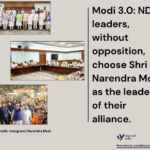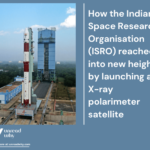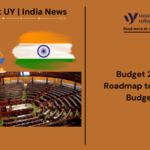With the technological advancements in the recent times, the concept of smart cities has come as a revolutionary approach to urban planning and development. Smart cities focus on the implementation of data-driven solutions and advanced modern technologies towards the improvement of urban life in multifaceted aspects, starting from transportation, governance, infrastructure and sustainability. It is forecasted that by 2030, around 60 per cent of the population of the world will live in urban areas.
With the rapid urbanization, many countries, especially in Asia and Africa, are experiencing challenges in the fulfilment of the needs and requirements of the increasing urban populations, which include transportation, housing, energy systems, healthcare, education and other infrastructure. In this regard, the idea of smart cities has emerged as one of the promising and innovative solutions to the rising urban challenges.
As the integral part of smart city development, the usage of data has been prioritised the most for efficient decision-making and governance. Smart cities leverage IoT devices, data analytics, sensors and other advanced digital solutions for the collection of information in real-time about various aspects of urban cities, such as waste management, traffic flow, environmental pollution, and many others. After that with the processing and visualisation of the collected data, the city authorities provide emphasis on the development of up-to-date informed decisions relating to the navigation of the challenges of the urban environment for the improvement of citizen’s lifestyle.
Case studies of popular smart cities
Singapore, The Republic of Singapore
Singapore is one of the leading instances of smart cities globally, which is well-known for its balanced initiatives for the enhancement of productivity. The city-state aims to improve the multiple aspects of urban living, such as public safety and health, transportation, energy management and others, with a focus on the integration of technology and data-driven decisions.
In 2014, Singapore introduced the “Smart Nation” initiative with the aim of becoming a connected and technologically advanced city. As an effort towards this initiative, they have developed a digital healthcare system which empowers the usage of video consultations and wearable devices for providing care to patients remotely. There are also extensive sensor networks in the city which helps in understanding the needs of the citizens. An eco-smart forest city is also being developed in Singapore, which will ensure a vehicle-free zone.
Dholera, India
Dholera is being developed as the first and largest greenfield smart city in India, aiming to revolutionize urban development in the nation. The city is located in the Gujarat state of India and has been included in the “Delhi-Mumbai Industrial Corridor (DMIC)” project. The area of Dholera SIR (Special Investment Region) extends across 920 square kilometres. For the development of the roads, digital fibre is being used, and an extensive network of sensors is being implemented, connecting with a central operations centre. Dholera smart city project involves integrated transit networks, smart infrastructure, logistic hubs and a new international airport.

Songdo, South Korea
Songdo, situated near Seoul, has been developed as an efficient model and greenfield smart city for promoting urban living in the 21st century. The infrastructure of the city installed sensors for regulating and monitoring everything starting from energy consumption to traffic and temperature. The city has also implemented smart grids and meters for the optimisation of energy distribution, reduction of energy waste and integration of renewable energy sources more effectively with a focus on real-time monitoring. There is also an advanced waste management system in Songdo which aims at recycling and reprocessing of waste water. The recycling rate of Songdo is quite high, which is around 76.3 per cent which is effective for the development of a perfect eco-city.
Challenges and ethical considerations of smart city planning
While smart city planning has the significant potential to facilitate effective resource management and urban life improvement, it can also pose threats to data security and privacy. In order to remain fully functional, smart sustainable cities require the management of an extensive amount of data which presents concerns in maintaining the safety of sensitive information and preventing data breach incidents, especially when the incidents of cyber attacks are rapidly increasing worldwide. In the highly connected urban environment, the privacy rights of individuals can also be infringed.
The connected urban cities greatly emphasise data-driven decision-making. Therefore, the reliability and effectiveness of the integrated decisions may be reduced because of the lack of authenticity, transparency and accuracy of the collected data. The unequal access to digital solutions and digital technologies among the residents can also restrict them from accessing the smart services of the cities. For successfully developing the idea of smart sustainable cities, there is the requirement of a strong partnership between the private and public sectors. Nevertheless, it often becomes difficult because of the differentiations in the priorities as the public sector seeks to ensure the well-being of the residents, whereas the private sector aims to grab profitable business opportunities.
Smart Cities Mission in India
Prime Minister of India, Narendra Modi introduced the Smart Cities Mission in India on 25th June 2015. This mission seeks to improve the urban life in selected 100 cities in terms of providing access to advanced infrastructure, efficient services, and a sustainable environment with the help of smart solutions. Two approaches have been undertaken for the accomplishment of this smart city mission. In the first approach, an Area-Based Development (ABD) method has been undertaken for developing the selected 100 cities. In the second approach, Pan-City Projects have been included in every city, which focuses on the integration of technology-driven solutions.
Over 8000 multi-sectoral projects have been considered for the development of these cities. The projects amounted to around 1.64 lakh crore. As of now, over 90 per cent of the total projects or around 7482 projects worth approximately 1.5 lakh crore, which have been integrated under this Mission, have been accomplished. In the context of city wise projects, there are around 75 per cent accomplished projects in 75 cities.
FAQ
1. What is a smart city?
This provides emphasis on the implementation of data-driven solutions and cutting-edge technologies towards the improvement of urban life in multifaceted aspects such as transportation, governance, infrastructure, and sustainability.
2. What technologies are used in smart cities?
Smart sustainable cities leverage IoT devices, data analytics, sensors, and other advanced digital solutions for the collection of information in real time about various aspects of urban cities, such as waste management, traffic flow, environmental pollution, and more.
3. Provide some examples of successful smart cities.
Some of the leading examples include Singapore, Dholera, and Songdo.
4. What challenges do smart cities face?
Some of the prominent challenges of smart sustainable cities include data privacy and security threats, digital divide, lack of data transparency, and difficulty in public and private sector collaboration.
5. What is the Smart Cities Mission in India?
Prime Minister of India, Narendra Modi introduced the Smart Cities Mission in India on 25th June 2015. This mission seeks to improve the urban life in selected 100 cities in terms of providing access to advanced infrastructure, efficient services, and a sustainable environment with the help of smart solutions.

















